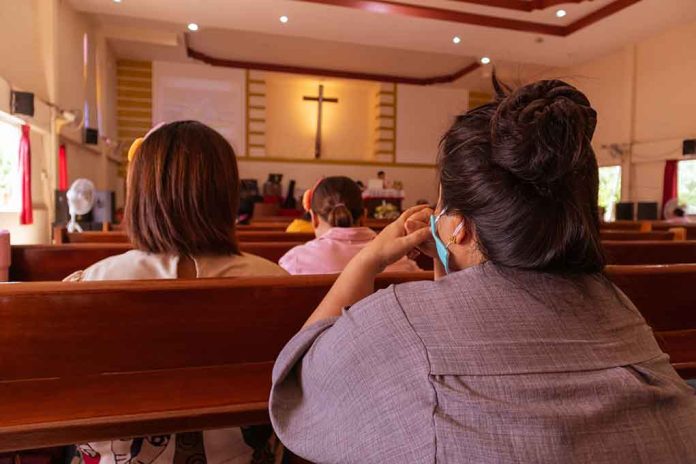
Pope Leo XIV inherits a Catholic Church in crisis with a $200 million deficit, unresolved sexual abuse scandals, and deepening internal division that threatens to tear apart the world’s oldest continuous institution.
Key Takeaways
- Pope Leo XIV faces critical financial challenges, including a Vatican deficit that worsened under Pope Francis and concerns about the pension fund’s viability.
- Despite Pope Francis’s reform attempts, sexual abuse scandals remain unresolved, with Leo XIV’s own past handling of abuse allegations under scrutiny.
- The new pope must navigate the divisive “synodal process” that has increased polarization between progressive and traditional Catholic factions.
- Leo XIV’s American background may bring needed efficiency to Vatican governance and financial management.
- Beginning his pontificate during the Jubilee Year of Hope, Leo XIV is positioned as a pragmatic bridge-builder seeking to unite the fractured church.
Financial Crisis Demanding Immediate Action
The Vatican’s financial situation has deteriorated significantly, with a deficit now exceeding $200 million annually. Pope Francis attempted reforms but ultimately left the Church’s finances in worse condition than he found them. Pope Leo XIV must address urgent concerns about the pension fund’s solvency, with warnings that it could be depleted within a decade without substantial intervention. The financial crisis extends beyond basic accounting issues to include allegations of money laundering and investment scandals that have damaged the Church’s credibility with donors and the faithful alike.
Further complicating matters was the scandal involving Cardinal Angelo Becciu, who was convicted of financial crimes yet attempted to join the conclave that elected Leo XIV against Francis’s explicit wishes. This power struggle highlights the entrenched resistance to financial transparency that the new pope must overcome. Leo XIV’s American background may prove advantageous, as American dioceses have implemented more rigorous financial controls than many of their global counterparts.
Sexual Abuse Legacy Requires Decisive Action
The sexual abuse crisis continues to haunt the Catholic Church, with Pope Francis leaving behind a mixed legacy of addressing these painful issues. While Francis made some progress, critics maintain that his actions often fell short of his rhetoric when confronting abusers and their enablers. Pope Leo XIV inherits a church still reeling from decades of abuse cover-ups and faces scrutiny over his own past handling of allegations. His success will depend on implementing transparent policies that prioritize victims over institutional reputation.
The American Catholic Church, from which Leo XIV hails, has implemented some of the most comprehensive abuse prevention measures globally, including strict background checks for volunteers and zero-tolerance policies for offenders. However, Leo must still confront criticism regarding his previous responses to abuse allegations. Victim advocacy groups are demanding unprecedented transparency, including opening Vatican archives related to abuse cases and ensuring accountability at all levels of the church hierarchy.
Bridging Deep Divisions Within the Church
Pope Francis said the synodal process, intended to create a more inclusive church through dialogue, inadvertently deepened divisions between progressive and traditional Catholics. Leo XIV must now define what the “synodal way” means in practice without alienating either faction. His choice of papal name may offer insight into his approach, potentially referencing Pope Leo XIII’s encyclical Rerum Novarum, which sought a balance between unfettered capitalism and radical socialism, perhaps signaling his intent to find middle ground in today’s polarized church.
“Known for solid judgment and a keen capacity to listen, and someone who doesn’t need to pound his chest to be heard,” writes Crux, a Catholic news website, suggesting Leo XIV’s temperament may help heal divisions where his predecessor’s more confrontational style sometimes increased tension.
Steve Bannon, former White House chief strategist, has already lambasted Leo XIV as the worst pick for Maga Catholics, highlighting the political dimensions of church leadership in our polarized era.
Tackling Contentious Social Issues
Leo XIV enters his pontificate during a period when the Catholic Church faces pressure to evolve on issues including female ordination, LGBTQ+ inclusion, and climate policy. While he has appointed women to advisory roles in bishop selection, he maintains opposition to female priests. His stance on LGBTQ+ issues remains ambiguous, though he has expressed openness to marginalized groups. Like his predecessor, Leo has been critical of harsh immigration policies and expressed support for climate action, positions that put him at odds with many conservative Catholics in America.
“Rebuild my church,” the famous instruction,” stated by St. Francis of Assisi, now falls to Pope Leo XIV at perhaps the most challenging moment in modern Catholic history.
The Jubilee Year of Hope provides a symbolic backdrop for Leo XIV’s first year, but the hard work of reform requires more than symbolism. His success will be measured by concrete actions on financial transparency, meaningful accountability for abuse, and his ability to foster unity without compromising essential church teachings. American Catholics, accustomed to more efficient church governance, may find themselves particularly satisfied if Leo brings those same management principles to the Vatican – or deeply disappointed if he fails to deliver on reform promises that have been made and broken for decades.





